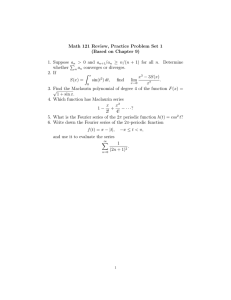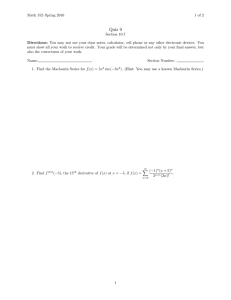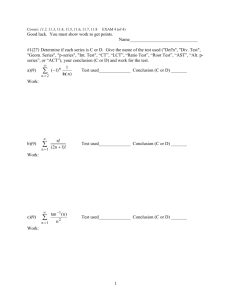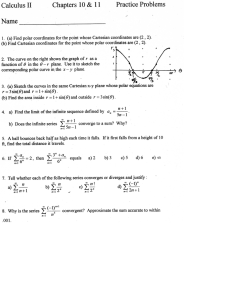Problem Points Score 1abc
advertisement
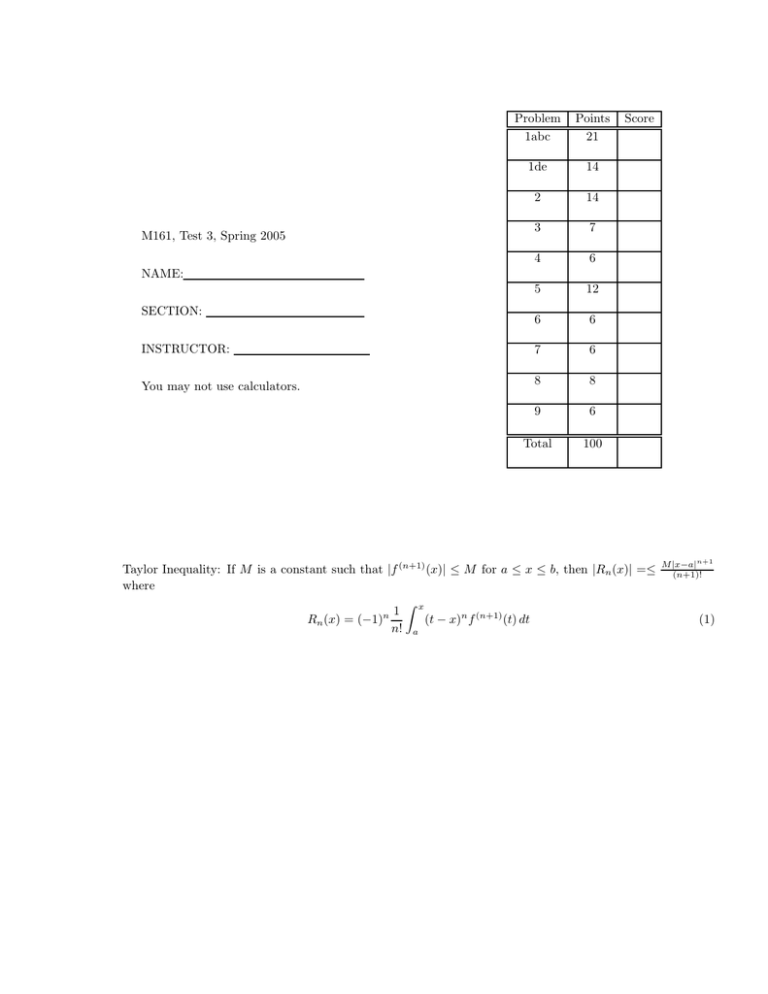
Problem 1abc Points 21 1de 14 2 14 3 7 4 6 5 12 6 6 INSTRUCTOR: 7 6 You may not use calculators. 8 8 9 6 Total 100 M161, Test 3, Spring 2005 Score NAME: SECTION: Taylor Inequality: If M is a constant such that |f (n+1) (x)| ≤ M for a ≤ x ≤ b, then |Rn (x)| =≤ where Z x n 1 (t − x)n f (n+1) (t) dt Rn (x) = (−1) n! a M|x−a|n+1 (n+1)! (1) 1. Determine whether the series is convergent or divergent. In either case explain why. You must justify your answers. ∞ X 2n (a) (2n + 1)! n=1 (b) (c) ∞ X n √ 3 n +n+1 n=1 ∞ X n=1 2 ne−n (d) (e) ∞ X n! n3n n=1 ∞ X n √ 2+n+1 n n=1 2. Determine whether the series is absolutely convergent, conditionally convergent or divergent. In any case, explain why. ∞ X (−1)n+1 (a) n + 2n n=3 (b) ∞ X (−1)n 21/n n=1 3. Determine the radius of convergence and the interval of convergence (including the endpoints) of the series ∞ X (x + 4)n . n3n n=1 4. (a) Derive a formula (a closed form formula, not one that is the sum of n terms) for the N th partial sums, ∞ X sN , of the series 2(0.4)2+n . n=3 (b) If the sum of this series exists (i.e. if the series converges), then find the sum of the series using the formula for sN (find an exact answer—no calculator). If the series does not coverge, then use the formula for sN to explain why. 5. (a) Find the first 5 terms of the Maclaurin series of the function f (x) = (1 − 3x2 )−1/3 . 1 are (b) If the first 6 terms of the Maclaurin series of the function f (x) = √ 1 − x2 1 3 5 35 8 63 10 (1 − x2 )−1/2 = 1 + x2 + x4 + x6 + x + x + ··· , 2 8 16 128 256 find the first 7 terms of the Maclaurin series of the function f (x) = arcsin(x). 6. The Maclaurin series for f (x) = cos x, series converges to f (x) = cos x for all x. ∞ X (−1)n x2n , converges for all x, −∞ < x < ∞. Show that the (2n)! n=0 7. (a) Find the Maclaurin series for the function f (x) = x cos2 x. Write the result in closed form—as a sum P∞ 1 n 2 n=0 an x . (Hint: cos x = 2 (1 + cos(2x)).) (b) Find the sum of the series series. n ∞ 2 X x +1 n=0 3 as a function of x. What is the interval of convergence of the ( 2 ex + e−1/x if x 6= 0 and assume that f (n) (0) = 1 for n = 0, 1, 2, 3, . . .. 1 if x = 0 (a) What is the Maclaurin series for f ? 8. Let f (x) = (b) What is the interval of convergence of the Maclaurin series? (c) For what values of x does f (x) equal the sum of the Maclaurin series? ∞ X 1 and the function f (x) = √ , which is graphed below. Illustrate the proof of x n=1 the integral test by drawing appropriate rectangles on the graph to deduce that 9. Consider the series 1 n1/2 n X i=1 ai = 1 11/2 + 1 21/2 + 1 31/2 + ···+ Explain in your own words how this shows that the series 1 n1/2 ≥ Z 1 n+1 1 dx. x1/2 ∞ X 1 is divergent. 1/2 n n=1 y 1 y= 1 5 1 x1/2 10 x
